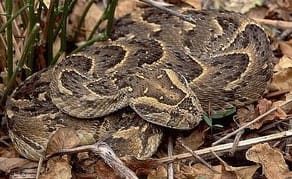The Islam religion restricts followers' diet to be of "halal" (permissible) and "haram" (forbidden), such as kosher meat and no pork for Judaism. Tortoises are considered to be "unclean" because of their eating habits in the desert, however many villages believe tortoises are magically powerful and their flesh and eggs will cure many ailments, including being a talisman to ward off snakes from their household.
 |
| Madagascar Tortoise |
Snakes are extremely feared and killed when found, deeming snake charmers to be great conquerors of that fear when seen by the public
 |
| Puff-Adder |
Desert monitors are seen as being ancient reincarnations of their ancestors, but also extremely deadly and feared, often being seen as being more terrifying than snakes since they are known to kill camels. Prehistorically, however, lizards were commonly eaten (kinda like turtles for seafarers) despite them being considered "halal."
 |
| Desert Monitor |
As a whole many reptiles are seen as being powerful and fearful, most likely due to their aggression and perseverance in such an unforgiving environment, and the Islam religion has rulings that follow along with fearing these animals.
Sources:
https://www.tortoisetrust.org/articles/exploit.html
http://www.livescience.com/43884-medieval-arabs-ate-lizards.html
2 comments:
This article was interesting, the reason I found it to be so interesting was because whenever you live in a society who’s lifestyle revolves around such horrible conditions, you only have a few options on the menu. I could imagine vegetation being scarce in the warm dry environment, along with water and other vital resources. One of the things that make these people so courageous is their willingness to survive out in these remote locations. One of the resources they utilize as a source of nourishment are the fierce predators that lie within these harsh environments. Lizards seem to be the meal of choice and when its comes down to it, between life or death, would you be willing to catch and eat something as fierce as a lizard the size of a small dinner table or suffer heat exhaustion to find the nearest source of drinking water. One of the advantages of eating a reptile in a dry environment instead of a mammal is the fact that reptiles excrete uric acid which reduces water loss and is less toxic, compared to urea which is more toxic.
Interesting. I wonder about the extent stem from Islamic/Abrahamic faith traditions versus the physical environment and the specific animals found there. Comparing with other Middle Eastern/North African areas with different religious backgrounds could be informative.
Post a Comment